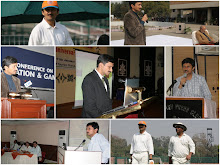Retirement is a phase that all of us are bound to reach one day. Even the most energetic self employed professional or businessman knows when it’s time to hand over the baton to someone who is younger, though not necessarily more capable. For a government servant, the day when he has to lay down his pen is pre-ordained, barring a sudden revision in the official age of retirement.
Chandigarh is no longer only a city of the retired, but it does offer one an
opportunity to come across many known figures from yester years who wielded immense
power in their time, and who had retired gracefully from service. What one does notice is that while the old gleam in the eye is still there, along with the booming voice (in some cases a not-so-booming one), there is a perceptible change in attitude. Government service certainly has its highs, and many officers enjoy extraordinarily vast influence within and without their sphere of authority. Retirement somehow transforms that authoritative presence into a milder, amiable and friendly manner.
But it is not the retiree who is at “fault” for this change, it is our society. The last of the sycophants deserts an officer who no longer commands respect by virtue of his post. His “true friends” turn out to be turncoats when an officer ceases to be in service. People even start looking the other way, and the venerable figure starts feeling the pangs of being no longer even half as popular as he used to be. Invitation lists no longer include his name. Even his last “loyal” official servant makes his excuses and moves to “greener pastures”. We who are still in service are the ones most to blame for the sinking feeling that a retired official may feel. A cup of tea and undivided attention may not be essential for a current colleague on a visit, but at least an offer of the same should be really necessary in case a retiree happens to enter one’s room.
A recently retired officer found to his discomfort that his last immediate
subordinate had suddenly stopped addressing him as Sir, and had started calling him by his name, albeit with the suffix “sahib” attached. Feeling upset, he called up a retired colleague and told him of his plight. The latter listened for a while and then cut him short with the words, “Be grateful that he speaks to you at all. My former colleagues have started avoiding my calls altogether.”
A retired officer may indeed have a tear in his eye at such treatment, for the pride
is still intact within. But the queues of people waiting to meet him have been replaced by unending queues of which he now finds himself a part. Such are the ways of our world. C’est la vie!
WITH A TEAR IN THE EYE
Subscribe to:
Post Comments (Atom)



No comments:
Post a Comment